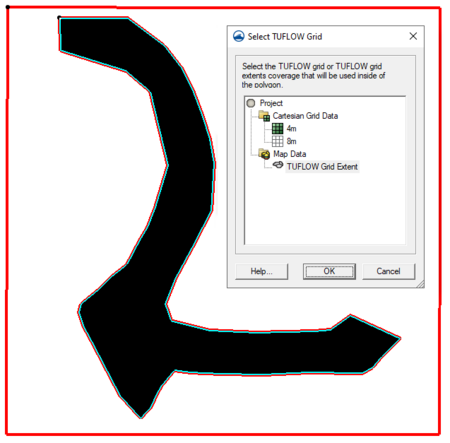SMS:TUFLOW Linking 2D Domains: Difference between revisions
From XMS Wiki
Jump to navigationJump to search
No edit summary |
No edit summary |
||
| Line 12: | Line 12: | ||
# Set the vertex spacing on the arcs that join multiple 2D domains. The spacing along these arcs determines how flows move between the domains. The rule of thumb to start with is to have the vertex spacing equal to 1.5 times the larger cell size. | # Set the vertex spacing on the arcs that join multiple 2D domains. The spacing along these arcs determines how flows move between the domains. The rule of thumb to start with is to have the vertex spacing equal to 1.5 times the larger cell size. | ||
[[Image:2Dto2DLinkage.png| | [[Image:2Dto2DLinkage.png|450px]] | ||
==Related Topics== | ==Related Topics== | ||
Revision as of 20:31, 4 January 2016
Any number of grids of varying sizes and/or orientations may be used in TUFLOW. Using multiple 2D domains requires that multiple 2D domains are licensed in TUFLOW.
To setup multiple 2D domains in SMS:
- Create multiple TUFLOW grids and associated grid components.
- Define a 2D/2D Linkage coverage and attributes (see below).
- Add all the 2D domains being used and the 2D/2D Links Coverage to the simulation.
There are a few important items to keep in mind when setting up a 2D/2D Linkage coverage.
- It's necessary that a polygon is enclosing each domain to be used. In the case below, a polygon is needed that covers the area outside of the main channel polygon.
- Each polygon needs to be linked to a specific 2D domain. This is done by double-clicking on each polygon and specifying the appropriate 2D grid.
- Set the vertex spacing on the arcs that join multiple 2D domains. The spacing along these arcs determines how flows move between the domains. The rule of thumb to start with is to have the vertex spacing equal to 1.5 times the larger cell size.
Related Topics
SMS – Surface-water Modeling System | ||
|---|---|---|
| Modules: | 1D Grid • Cartesian Grid • Curvilinear Grid • GIS • Map • Mesh • Particle • Quadtree • Raster • Scatter • UGrid |  |
| General Models: | 3D Structure • FVCOM • Generic • PTM | |
| Coastal Models: | ADCIRC • BOUSS-2D • CGWAVE • CMS-Flow • CMS-Wave • GenCade • STWAVE • WAM | |
| Riverine/Estuarine Models: | AdH • HEC-RAS • HYDRO AS-2D • RMA2 • RMA4 • SRH-2D • TUFLOW • TUFLOW FV | |
| Aquaveo • SMS Tutorials • SMS Workflows | ||
